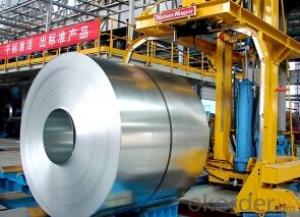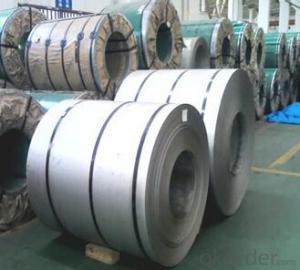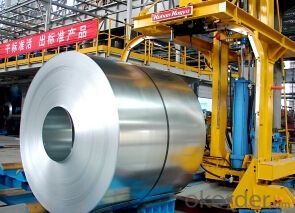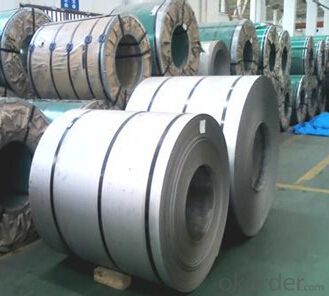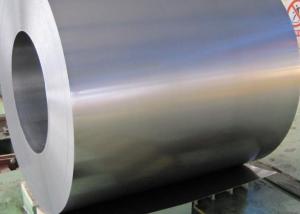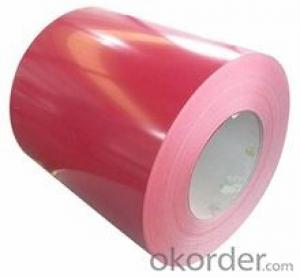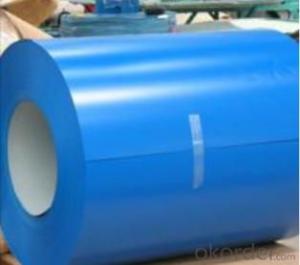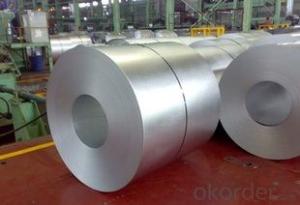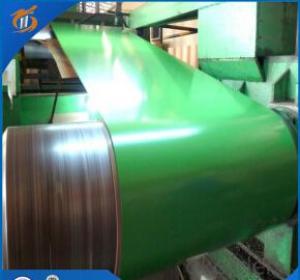Alu Zinc Coated Steel Coils for Construction
- Loading Port:
- Tianjin
- Payment Terms:
- TT OR LC
- Min Order Qty:
- 25 m.t.
- Supply Capability:
- 10000 m.t./month
OKorder Service Pledge
OKorder Financial Service
You Might Also Like
Description Basic Info.
Model NO.:0.50*1000*C
Surface Treatment:Alu-Zinc Coated
Technique:Cold Rolled
Standard:ASTM, JIS, GB, DIN, BS
Steel Grade:Dx51d-Az
Thickness 0.15mm to 3.00mm:Coil Width 600mm to 1250mm
Export Markets:Global
Additional Info.
Packing:Seaworthy, Standard Export Package, in Container
Standard:JIS G3321 SGLCC & DX51D-AZ
Origin:China
HS Code:7210610000
Production Capacity:150, 000 Metric Tons/Year
Product Description
Galvalume steel coils as follows:
1) Quality standard of galvalume steel coils: JIS G3302 SGCC, DX51D and ASTM A653
2) Grade of galvalume steel coils: SGCC (DX51D+Z) and SGHC
3) Hardness of galvalume steel coils: Both soft and hard quality are available
4) Surface finish of galvalume steel coils: Regular spangle, big spangle and zero spangle
5) Thickness of galvalume steel coils: SGCC 0.14-2.0 mm, SGHC 1.80-5.00mm
6) Width of galvalume steel coils: 914mm, 1000mm, 1220mm and 1250mm, thickness 600-1250mm is available
7) Finish by coil or sheet for galvalume steel coils: Both sheet and coil are available
8) Zinc coating of galvalume steel coils: 60-275G/M2, both sides
9) Weight per galvalume steel coils: 4-8 tons, also can be upon customer's requirements
10) Max loading weight in one 20ft container for galvalume steel coils: 25 tons generally
11) MOQ of galvalume steel coils: 25 tons for each item;
12) Actual shipping quantity of galvalume steel coils: More or less 10% generally;
13) Delivery time for galvalume steel coils: 15 days ganerally.
12) Applications of galvalume steel coils: Widely used for roofs, outer walls, ovens, explosive-proof steel, electrically controlled cabinets, and industrial freezers in the residential and industrial buildings.
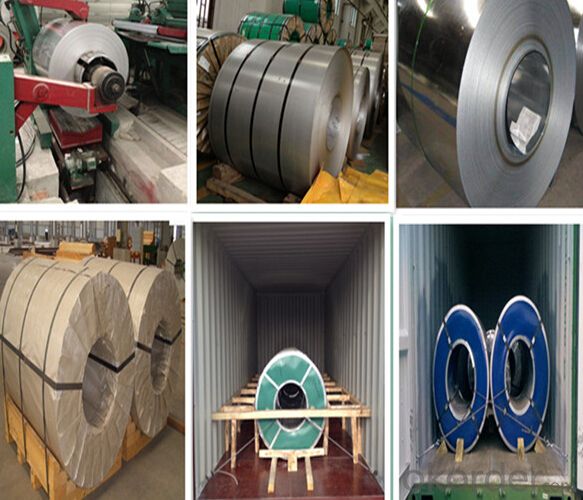
FAQ
1.What's your MOQ?
25MT, it is for one container.
2.Do you have QC teams?
Yeah, sure, our QC team is very important, they will keep the quality control for our products.
3. What's your normal delivery time?
Our delivery time about 10-20days for standard sizes, if you have other requirements like hardness and width ,it is about 20-40days. But don't worry ,we also try our best for the delivery time ,because time longer and our cost is higher.
4.Are the products tested before shipping?
Yes, all of our PPGI and GI was qualified before shipping. We test every batch every day.
- Q: For some reason, if you rub iron oxide or lodestone (both very crumbly, dark, mineral-like materials) into soft, unhardened steel, their particles actually get stuck into the surface of the steel (that is, darkening it). My question is, how does this work? How come iron oxide and lodestone can get stuck, and how come other materials (like silicone carbide, for example) do not?My second question is, are there any materials that can get stuck into steel, that is also blue in color, and how would I best obtain it?
- If you look at the surface of untreated steel even with a low power microscope you will see a surface that is far from smooth, there are pits and occlusions dotting the surface. Steel is not polished when you see it this way so the only treatment to the surface was the extrusion process or forming done on it by the presses. Iron oxide has a very small particle size and when pulverized into a powder it can easily fill the pits and voids in the steel surface coloring it.
- Q: I don't know why but I'm having a VERY difficult time finding the melting point of 1008 steel.
- 1. okorder 2. Input (melting point 1008 steel) as the search string 3. Check the links; the third one showed the answer in an MSDS
- Q: What is the difference between galvanized and galvalume steel coils?
- Galvanized steel coils are coated with a layer of zinc, which provides protection against corrosion. On the other hand, galvalume steel coils are coated with a combination of zinc and aluminum, offering enhanced corrosion resistance and better heat reflectivity. Additionally, galvalume steel coils have a longer lifespan and superior performance in harsh environments compared to galvanized steel coils.
- Q: Can solution annealing be done on carbon and low alloy steels. please give an explanatory answer.
- No. Carbon steel has two different crystal structures, FCC and BCC , depending on the temperature. when you heat steel up and then quench it, it locks the crystal structure into the BCC form. this makes it hard. whereas precipitation hardened austentic stainlesses remain BCC regardless of the temp, so the hardness change is not a function of thermally induced strain. you can anneal carbon steel but the thermal profile is closer to the precipitation profile of PH stainlesses than it is to the Solution annealing profile.
- Q: Why is the selection of steel building erector of extreme importance while starting a new steel building project?
- Because if the beaming is screwed up, everything in the building is at risk. Also, if the erector runs late, everything else is delayed. An incompetent erector can actually cause damage to the beams [especially if inadequate bracing leads to collapse] and getting new ones can severely delay the project.
- Q: I have a steel garage, it looks worn out hauled away? How can I maintain / repair it?
- Maintaining Your Steel Garage: # Clean your garage doors with a mild detergent using a soft car brush four times a year. # Clean the doors whenever they wash you car (washing your garage doors regularly will reduce the build up of corrosive elements) #Avoid using any abrasive cleaners or corrosive chemicals on or around your garage doors. # Avoid using salt near the garage door as it may corrode the door elements / hardware. Or you can paint your steel garage: #Step 1 Clean the door using a low-pressure sprayer. Combine 5 gallons of warm water and 1 cup of low-phosphate detergent to clean the surface. Rinse well and dry the surface. #Step 2 Lightly sand and smooth the scratches which do not go through to the metal substrate. Dust off sand residue. For a door with a baked on finish, use a powdered cleanser (diluted with water) and a soft brush to rough up the surface for better paint adhesion; do not use sand paper. Rinse with water and allow it to dry. #Step 3 Apply primer to areas where scratches permeate to the metal substrate to avoid future rusting or corrosion. Allow it to dry. #Step 4 Paint the door with an even coat of latex exterior house paint. If your steel garage has a dent check out the site(the last source link at the bottom)
- Q: What are the factors to consider when selecting a supplier for steel coils?
- When selecting a supplier for steel coils, there are several factors that need to be taken into account. Firstly, the reputation of the supplier in terms of providing high-quality steel coils is crucial. It is important for the steel coils to meet industry standards and have consistent quality to ensure the durability and performance of the final product. Secondly, the supplier should be reliable and able to consistently meet the demand for steel coils. They should have a proven track record of delivering on time and efficiently handling large orders. The cost of the steel coils is also a significant factor to consider. While competitive prices are important, it is equally important to ensure that the quality is not compromised. It is advisable to compare prices from multiple suppliers to find the best balance between cost and quality. It is also important to look for a supplier that offers a wide range of steel coil products. This will provide various options to choose from and ensure that the exact specifications and dimensions that meet the requirements are available. A supplier with technical expertise and experience in the steel industry can be valuable. They can provide advice and assistance in selecting the right steel coils for specific needs and help with any customization or special requirements. Considering the location and delivery capabilities of the supplier is also important. Choosing a supplier who is geographically closer to the facility can help reduce transportation costs and lead times. Lastly, good customer service is always preferable. The supplier should be responsive to inquiries, provide timely updates, and be willing to address any issues or concerns that may arise. By taking these factors into consideration, an informed decision can be made to choose a supplier that best meets the requirements for steel coils.
- Q: does he use a nylon guitar or steel?
- The correct term for what you are looking at is a classical guitar. Classical guitars always have nylon strings (steel strings will tear them apart). There is no such thing as a nylon guitar, and if there were, I don't think it would sound very good, although Mario Maccaferri did make some plastic ones that are quite collectible now. Steel guitar - as opposed to steel-string guitar which is what I think you mean - is the name of an entirely different instrument that doesn't look much like a guitar at all. There are also steel-bodied guitars which have a mechanical amplification system built in. However, normal classical and steel-string guitars are made of wood. A classical guitar usually has a slotted headstock with wide rollers, a wide uncambered fretboard, a 12-fret neck, an ornate soundhole rosette, no pickguard, a tied bridge with a straight saddle, and fan bracing. A steel-string guitar usually has a solid headstock or a slotted headstock with narrow rollers, a narrow cambered fretboard, a 14- or 12-fret neck, a simple rosette, a pickguard, a pin bridge with a slanted saddle, and X bracing.
- Q: We have to do a project for school on steel mines and i need 4 PROPERTIES OF A STEEL MINE PLEASE HELP!!! URGENT!!!
- There's no such thing as a Steel mine - steel is made from various raw materials (and now recycled metals). These materials may be mined separately and then combined at a steel mill - but steel is made, not mined. Steel, depending on what final characteristics they're trying to develop (strength, hardness, finish , etc.) can be comprised of iron, carbon, manganese, phosphorus, sulfur, nickel, chromium, etc. in varying quantities.
- Q: What is the role of steel coils in the automotive industry?
- The automotive industry heavily relies on steel coils as the primary raw material for manufacturing various vehicle components. These coils, made from high-quality steel, are shaped into a continuous strip that can be easily processed to create desired automobile parts. One crucial application of steel coils in the automotive industry is their role in producing body panels and frames. Through stamping and forming techniques, these coils are transformed into panels like doors, hoods, fenders, and roofs. Steel coils provide the necessary strength, durability, and rigidity to protect passengers and other vehicle components from external forces. Furthermore, steel coils are also used in manufacturing various structural components of automobiles. Chassis, suspension systems, engine cradles, and brackets are typically produced using steel coils due to their excellent mechanical properties. Their high tensile strength enhances the overall structural integrity of the vehicle, ensuring safety. Additionally, steel coils are integral in producing automotive springs, which are essential for the suspension system. Coil springs, leaf springs, and torsion bars are commonly used to absorb shocks, provide stability, and maintain proper ride height. The utilization of steel coils in these applications guarantees optimal performance, durability, and longevity of the suspension system. In conclusion, the versatility, strength, and durability of steel coils make them vital in the automotive industry. They are utilized in manufacturing body panels, frames, structural components, and suspension systems, contributing to the overall safety, reliability, and performance of vehicles.
Send your message to us
Alu Zinc Coated Steel Coils for Construction
- Loading Port:
- Tianjin
- Payment Terms:
- TT OR LC
- Min Order Qty:
- 25 m.t.
- Supply Capability:
- 10000 m.t./month
OKorder Service Pledge
OKorder Financial Service
Similar products
Hot products
Hot Searches
Related keywords
